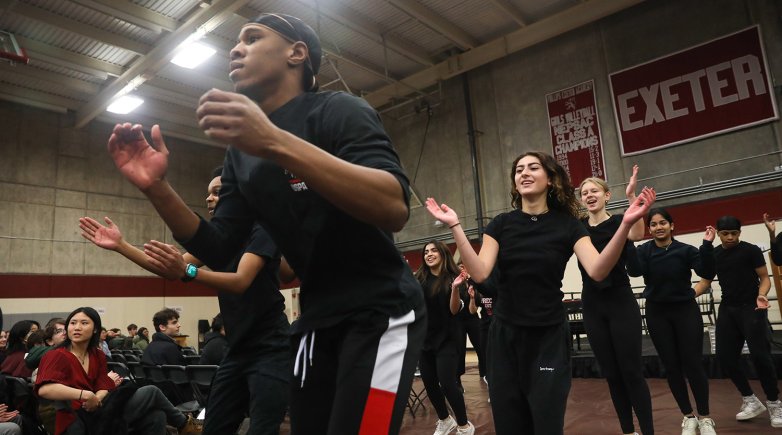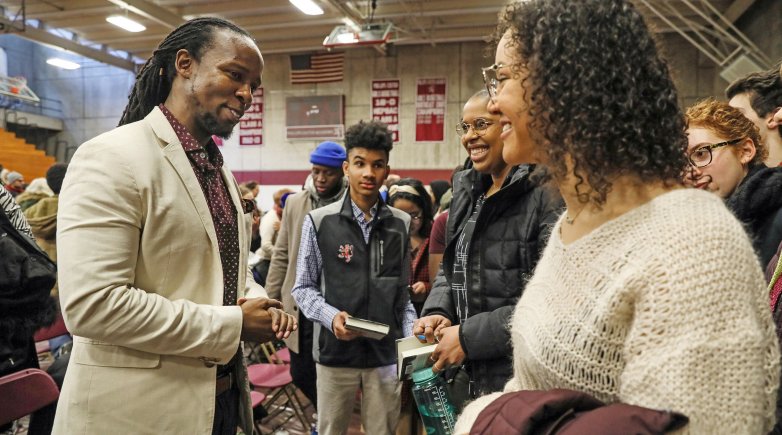'Create a new direction': Exeter honors MLK
Academy channels civil rights icon's legacy through discussion, workshops.
Exeter students, faculty and staff commemorated Martin Luther King Jr. Day on Monday, the Academy’s annual celebration of the life of the civil rights leader and his enduring message of social progress.
The tribute began with a keynote address by Anthony Davis ’69, a Pulitzer Prize-winning composer of the opera The Central Park Five, and his brother Christopher Davis ’71, a social researcher and educational reformer who worked with Anthony to create the opera X: The Life and Times of Malcolm X.
Principal Bill Rawson ’71; P’08 preceded the Davises to a stage in Love Gymnasium and challenged Exeter to learn something new about King and form a better understanding of his life and legacy.
“I turned 15 the day after Martin Luther King was assassinated,” Rawson told the students. “His words are as powerful and relevant to me today as when they were first spoken more than a half-century ago.
“I urge you to slow down over the next several hours and open your minds and hearts to the words and life of the Rev. Martin Luther King Jr. And together, as a community of students and adults, reflect on the meaning, relevance and importance of his life and legacy to your lives today.”
Exeter’s commemoration, in its 33rd year, included small discussion groups and interactive workshops under the direction of the MLK Committee.
Speaking to the time
Following a performance by student dance groups Precision and Outkast and a rendition of “Lift Every Voice and Sing,” commonly known as the Black national anthem, by Exeter’s Concert Choir, the Davises delivered a joint keynote. The brothers spoke of their experiences as young Black men at Exeter during the turbulent years spanning 1967 to 1971. From an early age, Anthony Davis channeled his political sensibility into his creative work, starting with a desire to upend the traditional white Western canon of classical music.
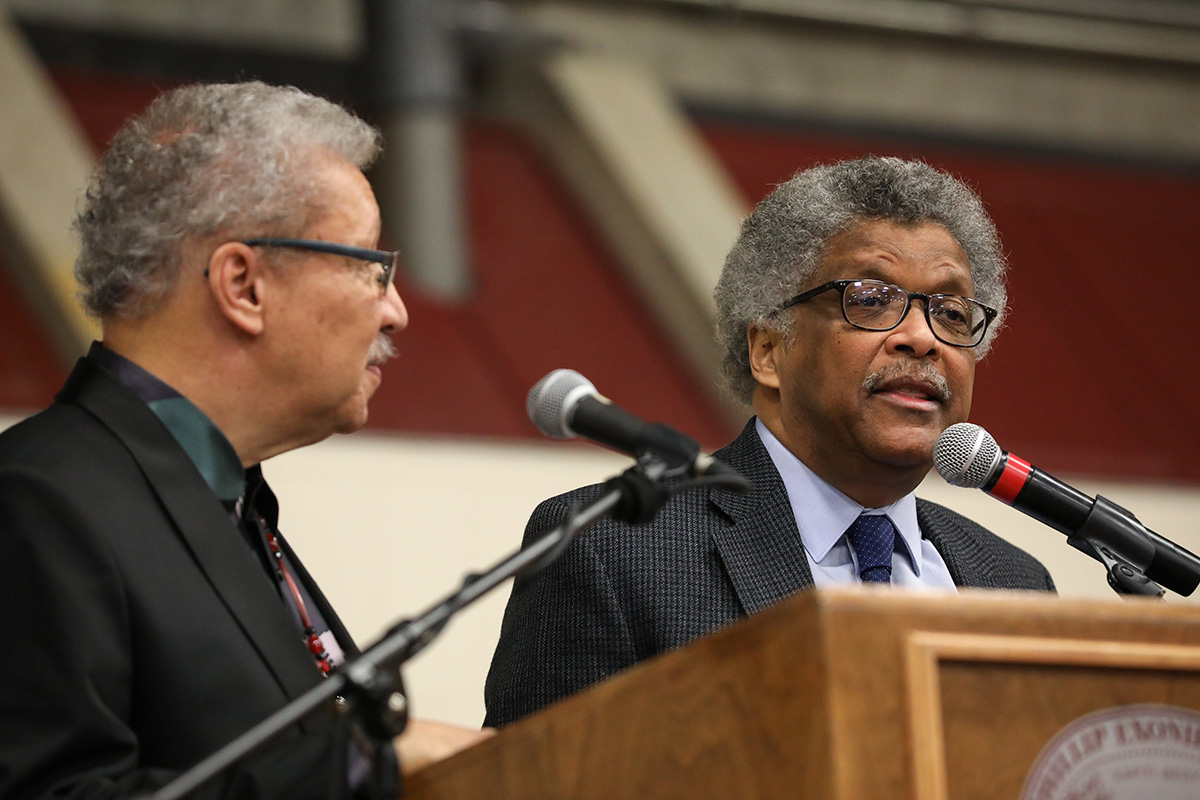
“I wanted to find out what my music was, what my music could be in response to the civil rights struggle of the ’60s,” he said. Later, he remembered thinking: “If someone could combine and bring a fusion of the African diaspora and jazz and improvisation with this formal structure of European opera, one could create a completely new form — a dynamic form that would speak to our time.”
The brothers also spoke of their efforts to tell stories through opera, and to re-cast operatic works with Black musicians and performers who were often missing or marginalized in the traditional opera world.
While reading The Autobiography of Malcolm X in college, Christopher recalled, it struck him that “there was a parallel in his evolution from Malcolm Little to Malcolm X to el-Hajj Malik el-Shabazz, to the development of Black music, and jazz in particular, in the ’60s.” He served as a storywriter for X: The Life and Times of Malcolm X, Anthony Davis’ first major opera, which had its world premiere in 1986 at the New York City Opera. Their cousin Thulani Davis, a poet and playwright, wrote the libretto. In November, a revised version of the opera will premiere at the Metropolitan Opera, becoming only the second opera by a Black composer in the Met’s history.
“There’s a whole generation of singers that have heard about this piece, but have never actually heard it or seen it,” Christopher Davis said, after playing an excerpt from a recent recording of X, which has been nominated for a Grammy Award. “When Anthony wrote The Central Park Five, and he won the Pulitzer, and George Floyd was murdered on the streets of Minneapolis, doors that had been closed for over 30 years for this piece reopened.”
Near the end of the keynote, Anthony Davis offered a challenge for current Exeter students in the audience, inspired by his own career breaking barriers in music as well as King’s inimitable legacy.
“I hope you all think about … how you can change the narrative, change the story, [and] make your own path to create a new direction,” he said. “I think that's what Martin Luther King envisioned for us — that we could have this potential to transform the world through our art, through our actions, through our activism.”
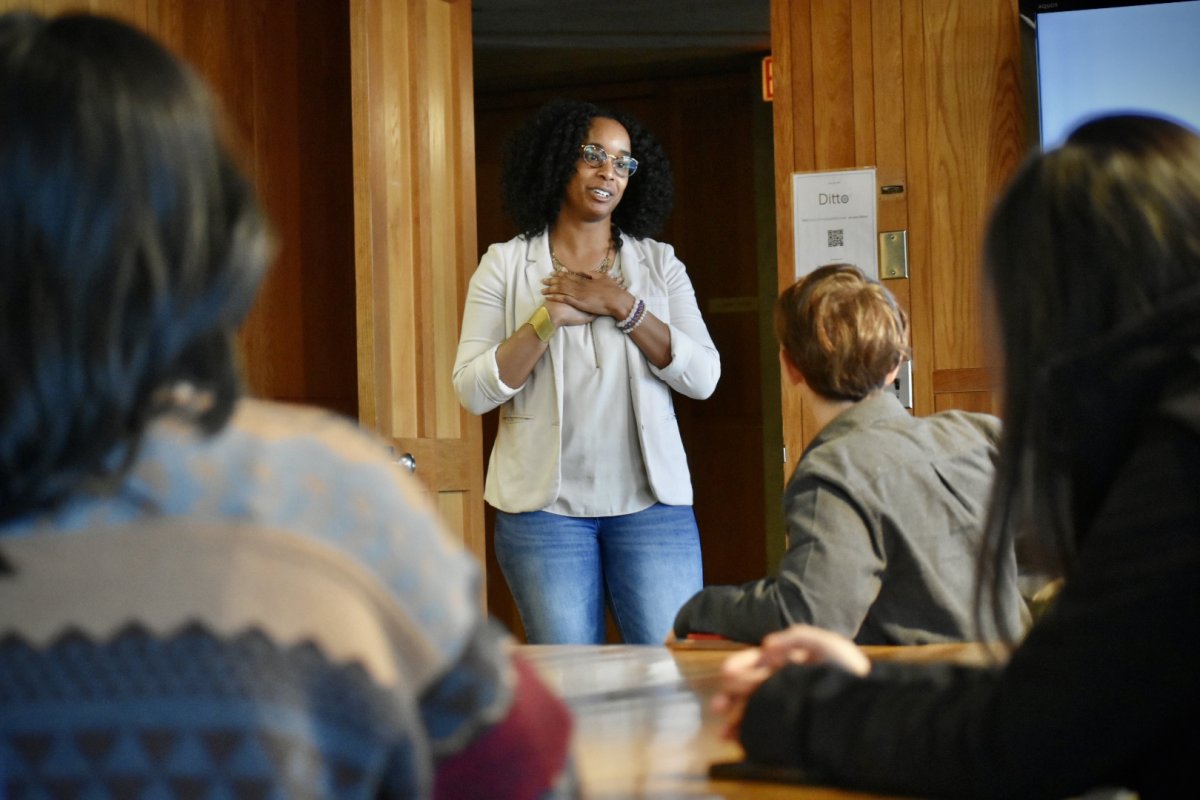
Making change
The MLK Committee’s robust program included workshops like “Looking Toward Paradise: How Do We Get There?,” a discussion on nonviolent protest in the face of white supremacy shepherded by Kelvin Green ’17; and “Writing for Justice: Spoken Word and the Movement,” led by English Instructor Willie Perdomo.
At “The Racial Wealth Gap and Its Impact on Education,” visiting speaker Stephanie Harvey explained to two dozen students on the top floor of the Class of 1945 Library about how systemic and generational disparities in wealth among white and people of color perpetuate inequality.
“So much of this disparity stems from the era of slavery,” said Harvey, a Ph.D candidate at the University of New Hampshire. “I know a lot of people are tired of hearing that … but we have to start there if we want to have an honest discussion.”
Four floors below Harvey, English Instructor Ellee Dean ’01 and Science Instructor Fran Johnson ’82 spoke to students in the workshop “Making Change at Exeter,” using as an example the successful effort to create all-gender housing at the Academy.
Dean acknowledged that inertia prevents change in most places. She said an important moment for her in the all-gender dorm movement came when she stopped “expecting people at the top to do something for me.” She recalled working closely with former colleague Alex Myers ’96 in writing the case statements that eventually were used to turn Kirtland and Williams houses into all-gender housing. “I didn’t have to wait for someone else to do the work.”
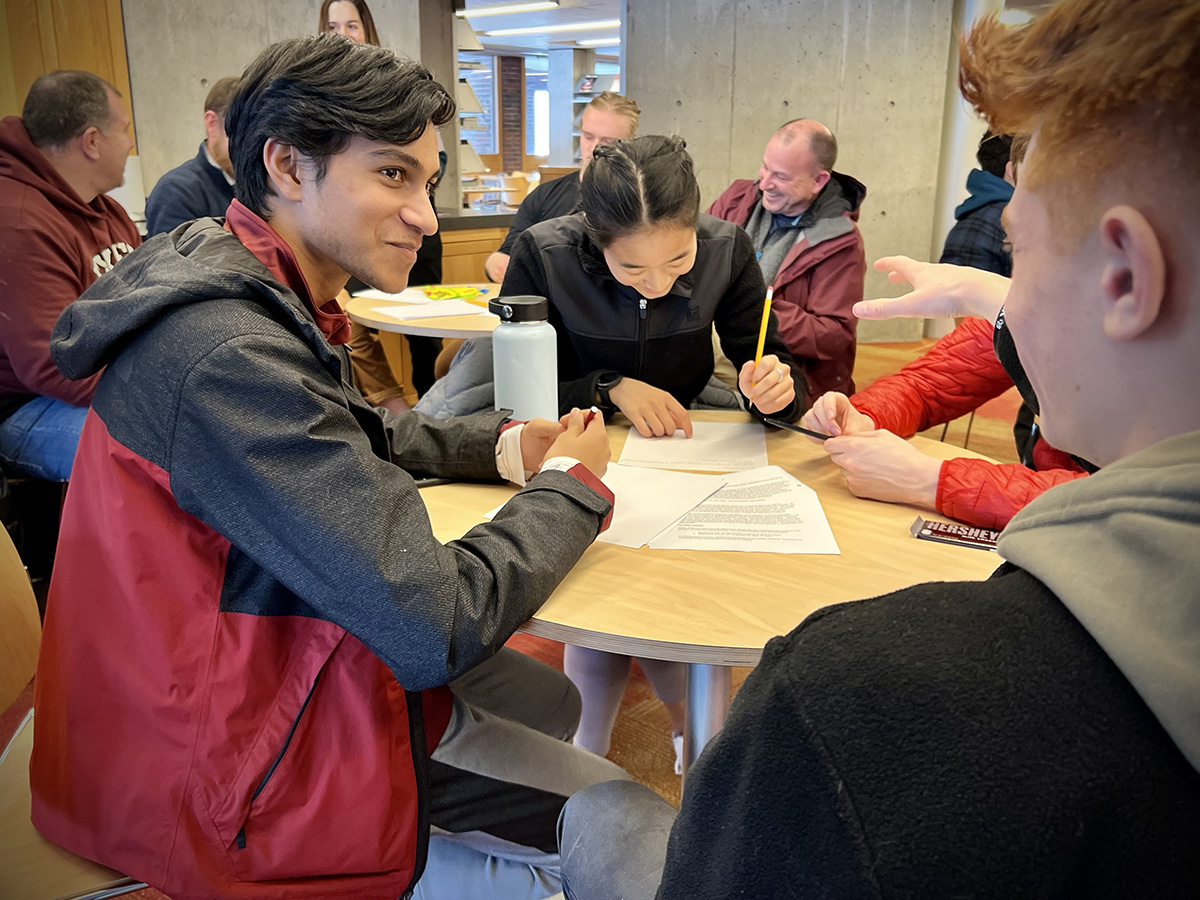
The workshop asked students how they may have contributed to promoting change. Advay Nomula ’24 spoke about his ongoing effort to expand the name of Phillips Church to Phillips Church and Multifaith Center to better reflect how the building serves the campus community. “It’s not enough just to call it a church,” Nomula said.
The day student from Dover said he was thrilled to hear Principal Rawson refer to the Multifaith Center in his opening remarks Monday.
“That’s progress,” he said with a smile.
Despair to dedication
Martin Luther King Jr. was assassinated on the evening of April 4, 1968, outside of room 306 of the Lorraine Motel in Memphis, Tennessee. In that moment, the inn on Mulberry Street instantly became connected with one of the most consequential and tragic moments of the civil rights movement. Years later, Memphis-born attorney D’Army Bailey, had a vision to preserve the site, not as a landmark for grief, but as the hub to carry forward MLK’s message.
Monday at Exeter, Bailey’s son Justin shared with students in the Elizabeth Phillips Academy Center Forum, how his late father established National Civil Rights Museum on the exact spot of King’s killing. “My dad thought that the movement shouldn’t die with Dr. King at that site,” he said. “He felt that it was hallowed ground and carried too much significance to just wither away. He envisioned a future of activism from that site.”
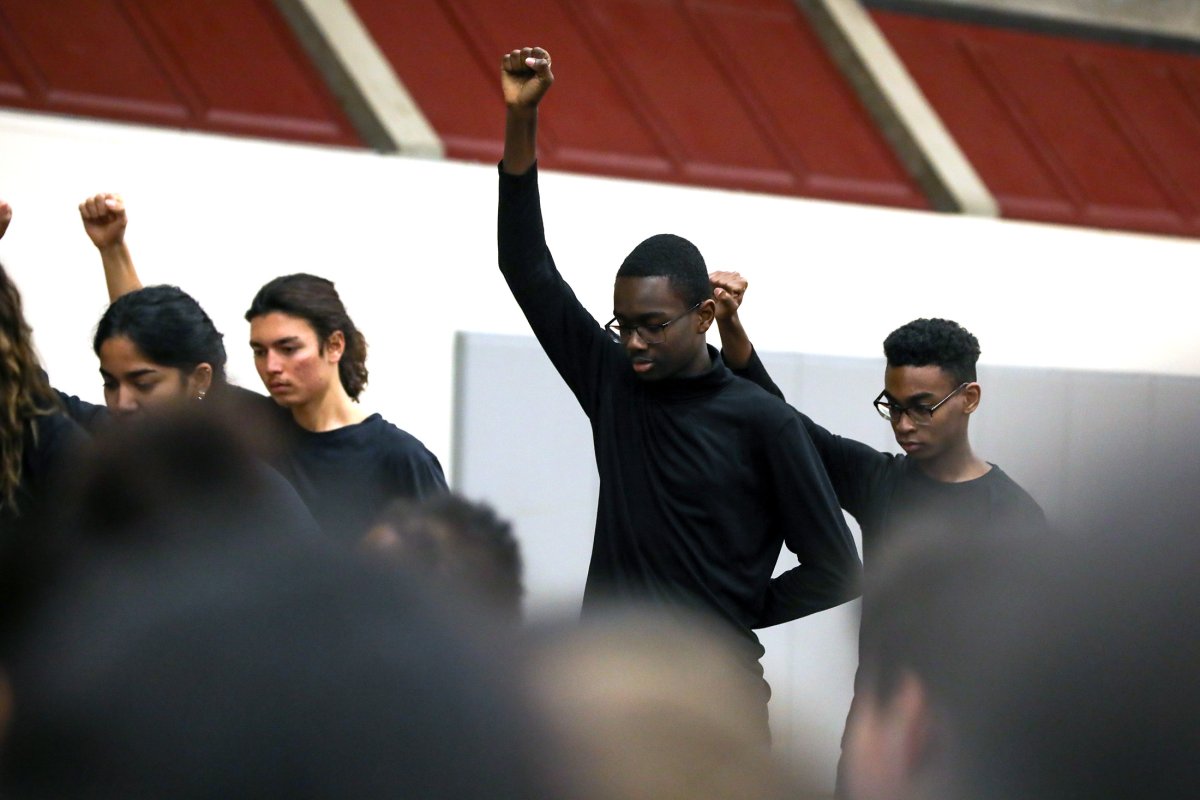
The elder Bailey purchased the Lorraine Motel in 1981 and a decade later the museum opened. Since then, millions of visitors, including around 90,000 students annually, have passed through the museum’s rotating exhibits and immersive experiences dedicated to the civil rights movement.
Among the dozens in attendance for Bailey’s talk was Jenny Drevitch ’23. “I took away the fact there was a positive that came out of Martin Luther King’s death and it’s something that continues to benefit the community,” she said.
